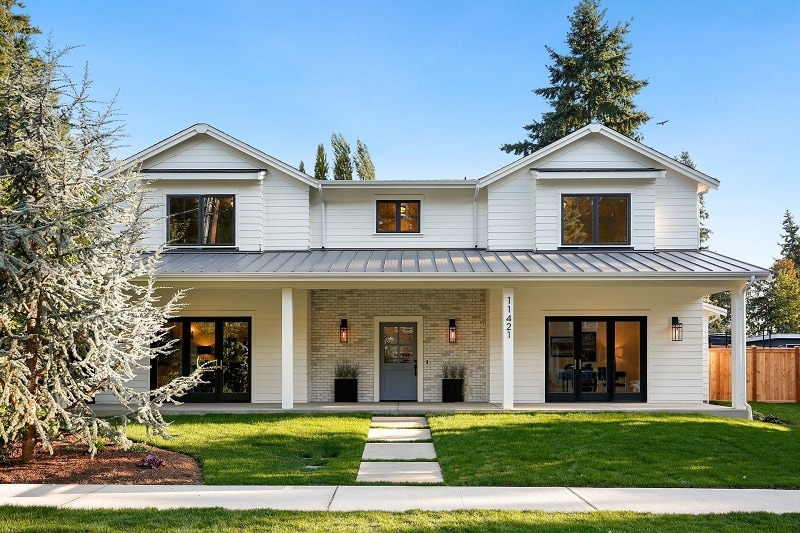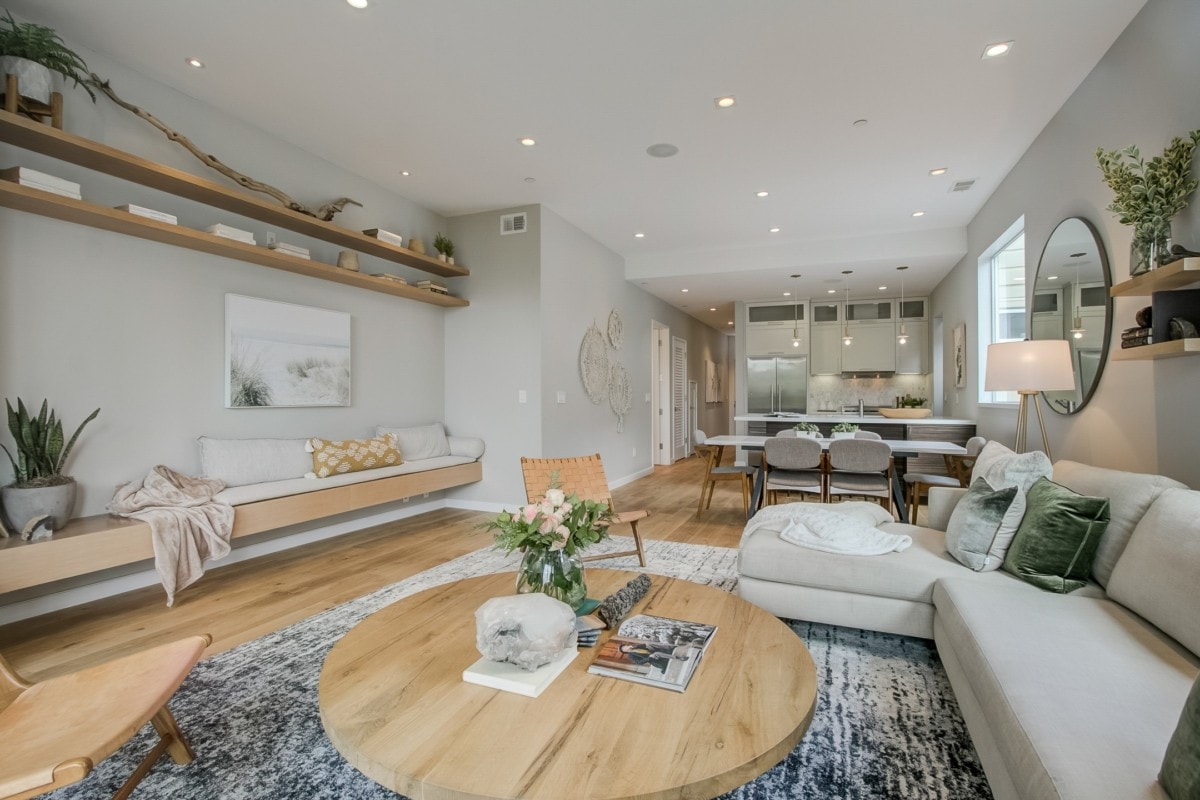Property values fluctuate as a result of many factors, and as a homeowner, it’s important to be aware of factors that can drive home value down. Some of these factors are out of your control, such as market conditions, interest rates, and the economy, while others are very much in your control. From unappealing renovations to neglecting maintenance on your home, some projects, or lack thereof, can negatively impact your property value. It’s best to be aware of what hurts property value so you can protect your home and get the most ROI when it comes time to sell.

1) DIY projects gone wrong
Many homeowners take on home improvement projects to not only make their space more livable and enjoyable but to also add value to their greatest investment. Whether it be a bathroom addition, adding a deck, or purchasing a fixer-upper with the promise of profit for flipping it – most people start a project with the idea that it will increase the value of the home. As exciting as the projects may be, they can sometimes turn out not as expected and hurt your property value.
Are you wanting to build a deck, extend the kitchen, or remodel the bathroom? Even if you’re an expert at smaller DIY projects, it’s better to leave the bigger remodels and renovations to a professional. If not executed properly, they can hurt your property value.
2) Lack of curb appeal
First impressions make a difference when selling a home. So, your curb appeal should entice prospective buyers and help your home sell faster. If you’ve noticed the exterior paint is chipping off or your trees and shrubs have seen better days, chances are potential buyers will notice too. Luckily, you can achieve great curb appeal with some minor adjustments.
- Update the exterior paint. The color of your home is oftentimes one of the first things a buyer will notice. Faded, chipped, and flaking paint can dramatically decrease your curb appeal and hurt your property value. Hire a professional painter and try to stick with a neutral color for the exterior of your home. A fresh coat of paint will do wonders for your home’s appearance.
- Update the exterior lighting. If the pathway leading to your front door is dimly lit or your fixtures are outdated, now is the time to update the exterior lighting. Exterior lighting helps your home feel more inviting and complements your landscaping. From post lights, LED lights, solar lights, and wall mounts, the options are endless.
- Switch out your old fence. Worn fences are an eye-sore and can take the attention away from your home and hurt your property value. Replacing your fence for a new one can give your yard the boost it needs by enhancing the greenery, and showing prospective buyers that you care. Fencing comes in a variety of different options such as wood, vinyl, aluminum, wrought iron, and composite. Consult with professionals to determine what material is best for you.
- Hire a professional landscaper. When selling your home, it’s best to go with an easy-to-care-for and clean landscape design to appeal to buyers, and increase the property value of your house. Simply edging the beds, mulching the garden, and pruning the trees and hedges can transform any landscape. Consider working with a professional landscaper to maximize your curb appeal.
- Wash the windows and the siding. It doesn’t take long for your house and windows to form a layer of dust, dirt, fingerprints, or even algae. This can leave your house looking dingy and gray and hurting your property value. Hire a professional for regular cleaning to avoid paint stripping, splinters, and mold and mildew problems.
- Replace your front door. It’s no surprise that front doors quickly begin to look worn and tired with daily use and harsh weather. Replacing your front door is a quick and cost-effective way to add curb appeal or add a pop of color to your home. Unsightly interior wall paint
3) Unsightly interior wall paint
Just like exterior house paint, streaky, chipped, or low-quality paint could discourage potential homebuyers and hurt your property value. A fresh coat of neutral paint on the cabinets, walls, and trim can make all the difference. Consider leaving the painting to the professionals. This way, you’ll avoid the chances of buying the wrong brush or roller, using too much, or not enough paint, or any other common painting mistakes homeowners can make.
Busy and bright wallpaper, tiles, or flooring can also divert the attention of the buyers away from your home. The best rule of thumb is to always choose neutral options for permanent items. Then incorporate color with your decor and furnishings.
4) Lack of upkeep
It’s important and necessary to keep your home in great condition and regularly perform general home maintenance chores. Letting your home fall into disarray and neglecting it will hurt your property value and could have dire consequences on your list price. Buyers will want to negotiate repairs to avoid any major expenses following the sale. This is why most buyers require an inspection contingency in their contract.
If something breaks, be sure to fix it. And if you don’t know how to fix it, hire someone who does. This will prevent any issues from getting out of hand. It’s often more expensive to remedy any problems the longer you wait. Keep an eye out for any problems with your roof, foundation, HVAC system, gutters, and if a rodent or pest infestation emerges. If you develop any of these issues it’s important to hire a professional immediately.

5) Wall to wall carpeting
Your carpet will be in great condition during the first few years of owning your home, but will quickly begin to show signs of use, start retaining odors, and can be difficult to keep clean. Not only will buyers be wary of wall to wall carpeting because it can be expensive to replace, but it can also collect indoor allergens. If possible, it’s best to stray away from carpet and opt for hardwood, laminate, or tile flooring.
If your home does have carpet, be sure to get it professionally cleaned periodically to prolong the life of it. It’s also a good idea to have it deep cleaned before listing your home for sale.
6) Excessive clutter can hurt property value
Every home manages to accumulate belongings throughout the years, and you usually don’t realize just how much clutter you’ve collected until you’re about to list your home. Just as dirt and grime build-up, so can clutter. If your room is overcrowded with stuff, it’s a good idea to clear some of your belongings out. Donate items you no longer need or want, and find hidden, permanent homes for the items you use just once in a while.
Decluttering is an inexpensive way to add value. It can, however, be a big job for just one person. Consider hiring a professional organizer and tackle the project together. After you’ve donated what you can, research a local junk removal and hauling service to collect the rest of your stuff – anything from mattresses and old appliances to electronics and unwanted furniture.
7) Unpleasant smells
Not only do offensive smells leave a bad and lasting impression, but they can also hurt your property value. Whether the lingering odor is cigarette smoke, pet odor, or mold, it’s best to identify the root of the smell and eliminate it. Avoid masking the smell with a strong perfume or fragrance.
To avoid unpleasant smells altogether, it’s best to keep your home clean. Routine cleaning includes vacuuming and dusting regularly, wiping down countertops and surfaces, and cleaning the bathroom and kitchen. Consider having your home professionally cleaned as you see fit. Most services allow you to choose the frequency of visits to suit your needs.
8) Unnecessary upgrades
Most of the time, home renovations and projects will increase the property value of a home. However, there are certain upgrades that can actually make your home less attractive at resale and can backfire. For example, if you live somewhere where the climate is generally cooler, perhaps Portland, OR or Twin Cities, MN, adding a backyard pool could make your home less desirable and hurt the property value. Or, ripping out a closet or bathroom to create a larger bedroom is generally unappealing to a lot of buyers and could be a costly mistake.
Other updates such as installing a new roof, adding insulation, and replacing windows will generally increase property value because you’re improving the efficiency and safety of the home. Updating your home’s electrical and refinishing hardwood floors can also add to your home appraisal value.
As a homeowner, keeping your home in optimal condition and making necessary updates over the years is key to getting top dollar when it comes time to sell.
The post What Hurts Property Value? 8 Things to Address Now appeared first on Redfin | Real Estate Tips for Home Buying, Selling & More.
